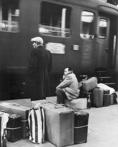"Other" cities: migrants and town planning
by Giovanni Attili
International migration is one of the most significant challenges of this epoch. In a world more and more globalized and interconnected, cities are constantly visited by a myriad of irreducible subjects, contemporary nomads taking part in individual or collective displacement processes. A multitude of land less people, seduced by the possibility of obtaining a better future in the "North World", is obliged, against its will, to live in precarious living conditions. These armies of uprooted individuals, seeking escape from war and/or famine, are waves of desperation often breaking against inhospitable coasts or against the walls of suburbs of western cities. Changing and "coloured" cities become places of original contacts, cultural contamination processes, informal nets, auto-representation contexts and conflicts. These are places where the insurgent migrant world represents the possibility of rethinking citizenship and the entire organization of the city; a city capable of receiving those who are definitely different and "not absorbable", a city open to new and unforeseeable matters connected with cohabitation, democracy, and solidarity. Town planners should take the challenge to try to understand what is happening in our cities rather then restrict themselves to be subjected to what seems ungovernable. In this, they should take a new route, look for different intersections of both local and not local policies . . . leaving the doors open to what is "instituting" rather than institutional.
The centrality of the previously outlined topic has leaded Planum to organise a section completely devoted to the theme "City and Immigration". This section is characterised by: video-interviews which have been realised with some of the most significant European speakers; an anthology subsection with links and articles; the results of the Public Competition which has been organised by Planum on the theme "City and Immigration"; a "case studies" subsection which gives hospitality to contributions, representations, study cases of Planum's users; book reviews which offer the most complete panorama of the different studies, research approaches and points of view, in order to sketch out the complex debate about these meaningful and insurgent themes; a forum, in order to stimulate participation, debates, reflections and suggestions among all the people interested in the creation of authentic communicative change context (with the consciousness that change is not a task to be delegated to the specialists. This is nothing new...but the life and the daily experiences of many individuals can contribute, in the same way, towards the change itself).




Planum
The Journal of Urbanism
ISSN 1723-0993
owned by
Istituto Nazionale di Urbanistica
published by
Planum Association
ISSN 1723-0993 | Registered at Court of Rome 4/12/2001, num. 514/2001
Web site realized by ChannelWeb & Planum Association | Powered by BEdita 3

